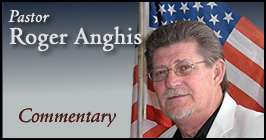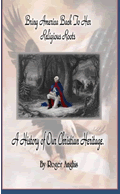POLITICAL SERMONS FROM PASTORS IN THE FOUNDING ERA
PART 17
By
Pastor Roger Anghis
December 8, 2013
NewsWithViews.com
A
Thanksgiving Sermon
December 15, 1774
By William Gordon
Pastor of the Third Church in Roxbury
This sermon was given at an event called the Boston Thursday Lecture. This event was founded by Reverend John Cotton in 1633. Even though its main purpose was a ministerial gathering the event was often used to discuss political and social issues. According to the Daily Free Press of the Boston University Faneuil Hall is still used today for discussions of social issues 380 years after its founding.
One of the things that we see in the messages of the pastors in the Founding Era is the acknowledgment of the sometimes need for war. Way too many pastors today bemoan any kind of conflict as ungodly and unneeded. That mindset can be no further from the truth.
Today’s pastors would have called our involvement in World War II as unnecessary and ungodly. Jesus Himself said to the disciples to arm themselves. This wasn’t the latest fashion statement either it was for defense. Luke 22:36 “Then said he unto them, But now, he that hath a purse, let him take it, and likewise his scrip: and he that hath no sword, let him sell his garment, and buy one.”[1] Reverend Gordon stated in his message that it had not come to a point, yet, to call for war: “Though, when we survey the country, we bemoan the attempts that have been made upon the ancient foundations of its civil government, which, if successful, will in all probability, after a time, undermine and destroy its religious liberties; yet we are thankful that no dwelling has been destroyed, —that none of any party have as yet perished by the shocks they have occasioned in the state, — that the sword hath not been commissioned by Heaven to destroy, and the way to an accommodation been rendered, still more inaccessible through the shedding of blood. We adore the goodness of God, which has kept us from being consumed by the ravages of war. It is of the Lord's mercies that we are not consumed, because his compassions fail not. And much more so that, in the distressing and alarming situation of our public affairs, there have been so many favorable circumstances to preserve us from fainting, to hearten us up, and to encourage our hopes in expecting that we shall at length, in the exercise of prudence, fortitude, and piety, get well through our difficulties.”[2] (Emphasis mine)
It should also be noted that Reverend Gordon and the majority of the pastors that preached God’s freedom and liberty believed and rightfully so that our freedoms and liberty were of God not government. Government was there to insure that these freedoms and liberties were not breached – by anybody. What had happened in Boston became a threat to all of the Colonies. Parliament had enacted four laws in 1774 in retaliation for the Boston Tea Party in 1773 referred to in the Colonies as the Boston Port Bill. They are also referred to as the Intolerable Acts described here:
Intolerable Acts, also called Coercive Acts, (1774), in U.S. colonial history, four punitive measures enacted by the British Parliament in retaliation for acts of colonial defiance, together with the Quebec Act establishing a new administration for the territory ceded to Britain after the French and Indian War (1754–63).
Angered by the Boston Tea Party (1773), the British government passed the Boston Port Bill, closing that city’s harbour until restitution was made for the destroyed tea. Second, the Massachusetts Government Act abrogated the colony’s charter of 1691, reducing it to the level of a crown colony, substituting a military government under General Thomas Gage, and forbidding town meetings without approval.
The third, the Administration of Justice Act, was aimed at protecting British officials charged with capital offenses during law enforcement by allowing them to go to England or another colony for trial. The fourth Coercive Act included new arrangements for housing British troops in occupied American dwellings, thus reviving the indignation that surrounded the earlier Quartering Act, which had been allowed to expire in 1770.[3]
Reverend
Gordon spoke of the consequences of these bills stating: “. .
. the blundering policy of the British ministry in giving so cruel a
cast to the Boston Port Bill, taking away by it private property, and
subjecting its restitution to the pleasure of the sovereign; in following
that so hastily with other acts, equally unjust and more extensively
pernicious, affecting the whole colony, and built upon principles and
claims that rendered every dwelling, plantation, and right through the
continent precarious, dependent on the will of the Parliament, or, rather,
of the junto or individual that hath the power of managing it; in declaring
openly, while supporting the bills, that their design was not against
a single town or colony, but against all America; in presuming that
the other towns and colonies, upon receiving the dreadful news, would
turn pale and tremble, conceal their spirit of resentment and opposition
in sneaking professions of tame submission, and abandon the distressed,
though their own ruin must have followed upon it, however slowly; and,
upon such presumption, neglecting to divide in time the different colonies
by flattering promises suited to their several situations, and by secret
purchases, ere they could form a general union; the reestablishment
of arbitrary power and a despotic government in a most extensive and
purposely enlarged country, contrary to the royal declaration given
a few years before, qualified somewhat to the inhabitants by that formal
security of their religious liberty which was noways wanting, but, as
is generally, I fear justly taught, with the base, diabolical design
of procuring their assistance, if required, in quelling the spirit of
freedom among the natural and loyal subjects of Great Britain;'”[4]
(Emphasis mine)
One of the biggest threats they believed they faced was the loss of
their religious freedom. They believed that it was the most important
of freedoms. With that freedom you could retain all other freedoms because
all freedoms flow from their Christian faith. The attack on the freedoms
of the Colonies caused an urgency to be ready for conflict that spread
throughout the Colonies. Local governments began to plan against the
possible spread of what had happened in Boston to spread throughout
the rest of the Colonies. The day the Port bill was to take effect,
June 1, 1774, was set aside for prayer and fasting and it was declared
that an attack one of the Colonies was an attack on all the Colonies.[5]
“the accounts
from different places and colonies forwarded to the capital for her
encouragement under her distress, and to assure her of assistance and
support, and that they considered hers in the true light of a common
cause—not in consequence of, but ere they had received her applications
for advice and direction, with the state of her situation; the forwardness
which showed itself everywhere to contribute to her relief, and to adopt
measures that might in the issue recover and secure the liberties of
this and the other colonies; the surprising agreement in opinion that
has prevailed in persons at a great distance from each other while consulting
for the general good, whereby they have been led to transmit by letters
nearly the same proposals to each other as though the inspiration of
the Most High gave them the like understanding; the fixing upon a general
congress, and choosing delegates, although in several places governmental
chicanery was used to prevent it; the tender, compassionate feelings
that every delegate, of whatsoever denomination, without party distinctions,
discovered for the Bostonians, under the free and affecting prayer of
a worthy Episcopalian, when, at the opening of the congress, they had
been alarmed with the false rumor that Boston had been attacked by the
military and navy; the amazing consequences that this false alarm did,
and continues to produce.
It proved the means of showing that the colonists were not to be intimidated, though martial appearances were to terminate in actual hostilities ; that they would be volunteers in the cause of liberty; and that they meant not to avoid fighting, whenever it became necessary. It put many thousands upon boldly taking themselves to arms, and marching forward, as they apprehended, to the assistance of their oppressed fellow-subjects. It kindled a martial spirit, that has spread through various colonies, and put the inhabitants upon perfecting themselves in the military exercise, that so they may be early prepared for the worst.”[6] (Emphasis mine)
| Subscribe to the NewsWithViews Daily News Alerts! |
As Reverend Gordon did in this message, so did the majority of the other pastors and that was address the political situation in the nation and preach the correct response to the theft of their liberties, and that was to fight for them. Today we are having our liberties stripped from us daily. Our 4th Amendment right to privacy has been shredded maybe beyond the point of salvaging yet no church will even talk about it. The church is doing what happened in Germany in the 1930’s and that is they remain silent about these things and when it comes to silencing the church, there will be no one to defend her. If the church remains silent we will see all of our liberties and freedoms be taken from us without a fight and the American experience won on biblical principles will be lost because the church has become silent.
Click here for part -----> 1, 2, 3, 4, 5, 6, 7, 8, 9, 10, 11, 12, 13, 14, 15, 16, 17, 18,
Footnotes:
1.
KJV.
2.
Pulpit of the American Revolution, John W. Thorton, The Federalist Papers
Project, (Gould and Lincoln, Boston), p. 216.
3.
Intolerable
Acts
4.
Pulpit of the American Revolution, John W. Thorton, The Federalist Papers
Project, (Gould and Lincoln, Boston), p. 220.
5.
Pulpit of the American Revolution, John W. Thorton, The Federalist Papers
Project, (Gould and Lincoln, Boston), p. 220.
6.
Pulpit of the American Revolution, John W. Thorton, The Federalist Papers
Project, (Gould and Lincoln, Boston), pp. 221-222
� 2013 Roger Anghis - All Rights Reserved
Pastor Roger Anghis is the Founder of RestoreFreeSpeech.org, an organization designed to draw attention to the need of returning free speech rights to churches that was restricted in 1954.
President of The Damascus Project, TheDamascusProject.org, which has a stated purpose of teaching pastors and lay people the need of the churches involvement in the political arena and to teach the historical role of Christianity in the politics of the United States. Married-37 years, 3 children, three grandchildren.
Web site: RestoreFreeSpeech.org
E-Mail: editor@restorefreespeech.org













 Share
This Article
Share
This Article






